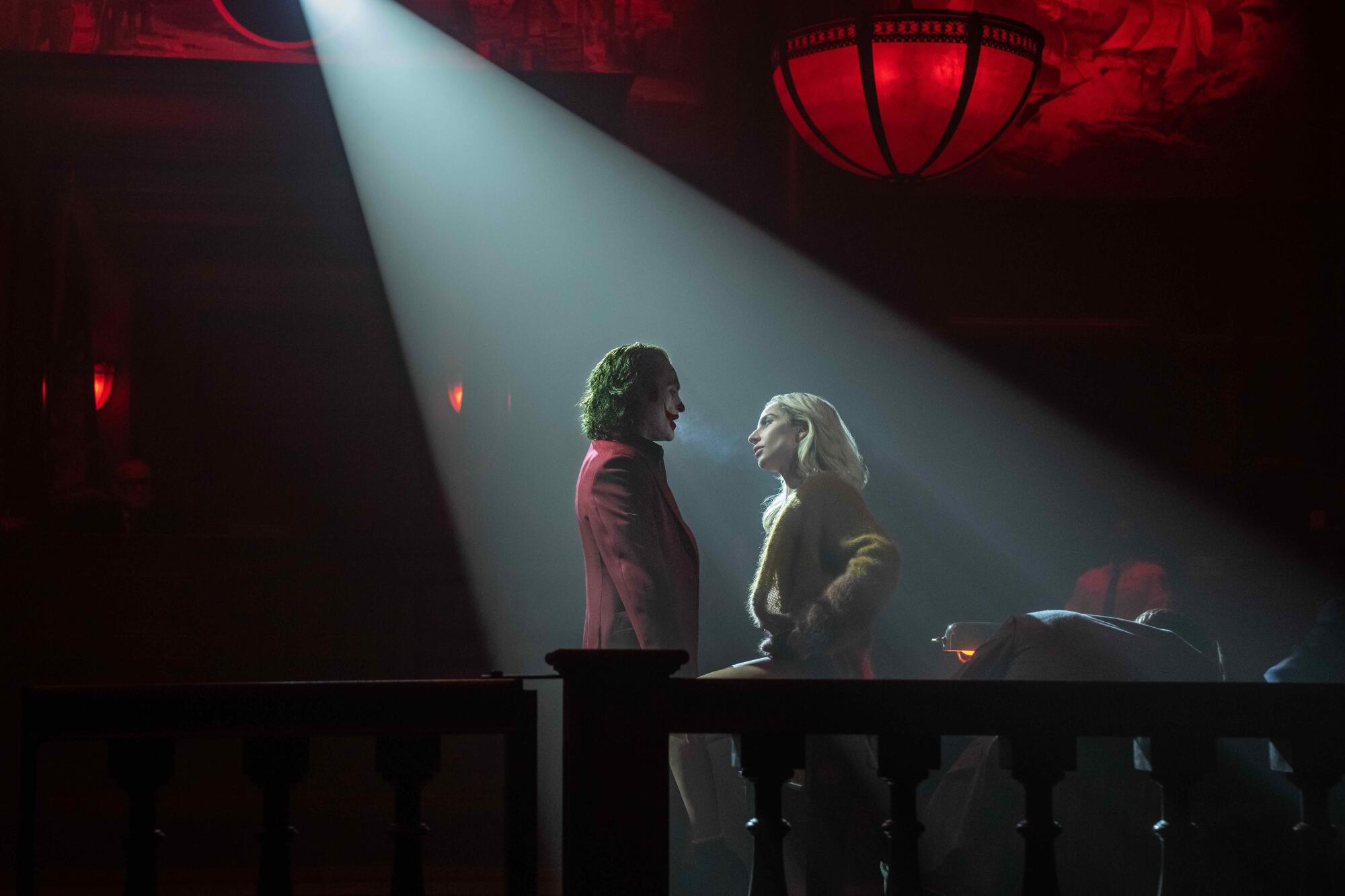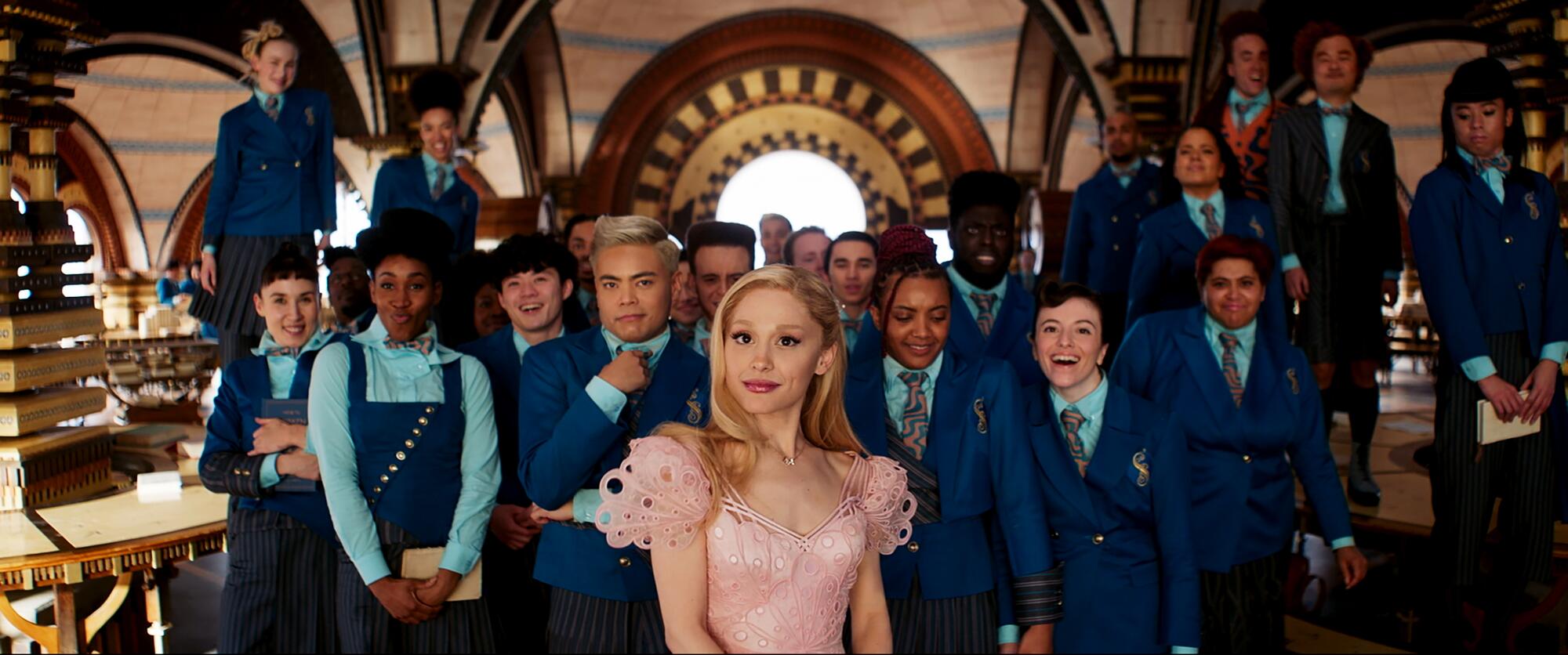
- Share via
Some of the high notes of the upcoming movie calendar are the many musicals heading to the screen: Warner Bros.’ Joaquin Phoenix-Lady Gaga starrer “Joker: Folie à Deux” (Oct. 4), Netflix’s tuneful crime drama “Emilia Pérez” (in limited release Nov. 1), Universal’s adaptation of the Broadway musical “Wicked” (Nov. 22), Netflix’s princess quest “Spellbound” (Nov. 22), Disney’s animated “Moana 2” (Nov. 27) and a CGI prequel, “Mufasa: The Lion King” (Dec. 20).
And this lengthy list doesn’t yet include buzzy music-related movies now on the fall film festival circuit that still might nab release dates in the coming months: Pablo Larraín’s Maria Callas biopic “Maria,” starring Angelina Jolie, Joshua Oppenheimer’s apocalyptic feature “The End,” Anderson .Paak’s South Korean-set story “K-Pops” and Rebel Wilson’s directorial debut, “The Deb.”
It’s rare for a three-month span to offer such volume and variety in the musical genre: animated adventures and live-action titles, family-friendly fare and grittier, offbeat dares. Only one is an adaptation of a well-known stage show. (Well, technically, half a stage show, since “Wicked” will be split across two installments and the pictures released a year apart.)
Among the titles that have our writing staff stoked: “Gladiator II,” “Wicked,” “Joker: Folie à Deux,” “Blitz,” “Anora,” “We Live in Time” and “The Apprentice.”

So what’s behind this year’s deluge of song and dance? Just as 2002’s “Chicago” became a hit after the Sept. 11 attacks and 2016’s “La La Land” served as a salve after Trump’s election win, this form has been particularly popular during or after unprecedented times. In terms of our current landscape — for example, a global pandemic, a nationwide recession, a pivotal presidential election — this year’s entries might offer audiences the onscreen resolutions they crave.
“It’s no surprise that when we go through moments of societal and economic adversity, and it seems like we’ve been fractured beyond repair, the musical can step in with a utopian message of hope and resilience,” says Desirée J. Garcia, an associate professor at Dartmouth College and author of “The Movie Musical.” “It’s a genre that has lent itself to an ending of coming together and overcoming any kind of division and conflict that exists.”
But just because characters suddenly belt out lyrics doesn’t mean their stories are all escapist entertainment. “Movies like ‘Gold Diggers of 1933’ that were in response to the Great Depression, or ‘Fiddler on the Roof’ and ‘Cabaret,’ which were released during the 1970s — they really spoke to the dark side of humanity,” Garcia adds. “These musicals made a real comment on what the world had become and reflected society back to itself in a very real way. And it’s precisely the cynicism and disillusionment of such times to which the musical has historically ministered.”
Center Theatre Group and Deaf West Theatre’s musical production reopens Los Angeles’ Mark Taper Forum in October.

Even amid the uncertainty of today’s moviegoing era, musicals can still break through at the box office. “The Little Mermaid” and “Wonka” were among 2023’s highest-grossing movies, with “Wish” and “Trolls Band Together” also earning more than $200 million worldwide.
“Musicals have the potential to be blockbusters because they typically can bring in a large number of families,” says Kevin Goetz, founder and chief executive of Screen Engine/ASI, a market research and data analytics firm. Goetz told The Times that although movies previously aimed to appeal to all four quadrants — male and female audiences and those over and under 25 — today’s titles need to entice a majority of eight octants: boys, girls, moms, dads, teenage boys, teenage girls, nonparent males and nonparent females.
“You have a real runaway success when it appeals to six or seven of those octants,” he says, citing “Wonka,” which grossed $632 million worldwide. “‘Wonka’ was quite charming and, because it was released during the holiday season — the perfect time of year for family movies — it became the perfect compromise movie: ‘Someone in my family really wants to see it, it looks fun enough, I’ll go see it with them.’ It was enough to bring out constituents from all eight demographics, and as a result, it did exceedingly well.”
The much-anticipated reopening of the Mark Taper Forum, ‘Lightscape’ at Disney Hall, a big debut in San Diego: Here’s our shortlist to the most promising shows in the season ahead.

Like “Wonka” and “The Little Mermaid,” the four musicals scheduled for theatrical release later this year “aren’t super big artistic swings, nothing too audacious and unusual,” says Karie Bible, a film historian and box-office analyst at Exhibitor Relations. “I don’t think they’re big risks, simply because they’re all based on beloved intellectual property, so they’ve already got a built-in audience.”
That the season’s two relatively original musicals — “Emilia Pérez,” the gender-transitioning Mexican crime title that won Cannes’ jury prize and actress awards earlier this year, and “Spellbound,” an animated fantasy with an all-star cast and songs by “Tangled” duo Alan Menken and Glenn Slater — are premiering on Netflix makes a certain sense. “They can really succeed on streaming because these platforms have the ability to surgically find those folks it’ll appeal to,” says Goetz.
A darkly surreal fantasia about Hollywood misogyny, “The Substance” delivers some of the year’s most fearless acting, along with a bold new directorial voice.

Musicals or otherwise, the barrier to win over theatrical audiences remains higher than ever. “The world has changed, and what’s happening in theatrical moviegoing right now is that you see more people going to a movie theater, but they’re seeing far fewer films,” Goetz says. “If you’re asking people to leave their homes to go to a movie theater and spend upwards of $70 for a family of four’s tickets, concessions and parking, you better have an offering that is significant enough for it to be one of the few movies they see a year.
“The movies that have already overperformed this year — including ‘Deadpool & Wolverine,’ ‘Twisters’ and ‘It Ends With Us’ — are real events for their targeted audiences, things that people are running to the theater to see. Some of these movie musicals, to me, are truly events, and there’s tremendous opportunity for the right one.”
More to Read
Only good movies
Get the Indie Focus newsletter, Mark Olsen's weekly guide to the world of cinema.
You may occasionally receive promotional content from the Los Angeles Times.
















